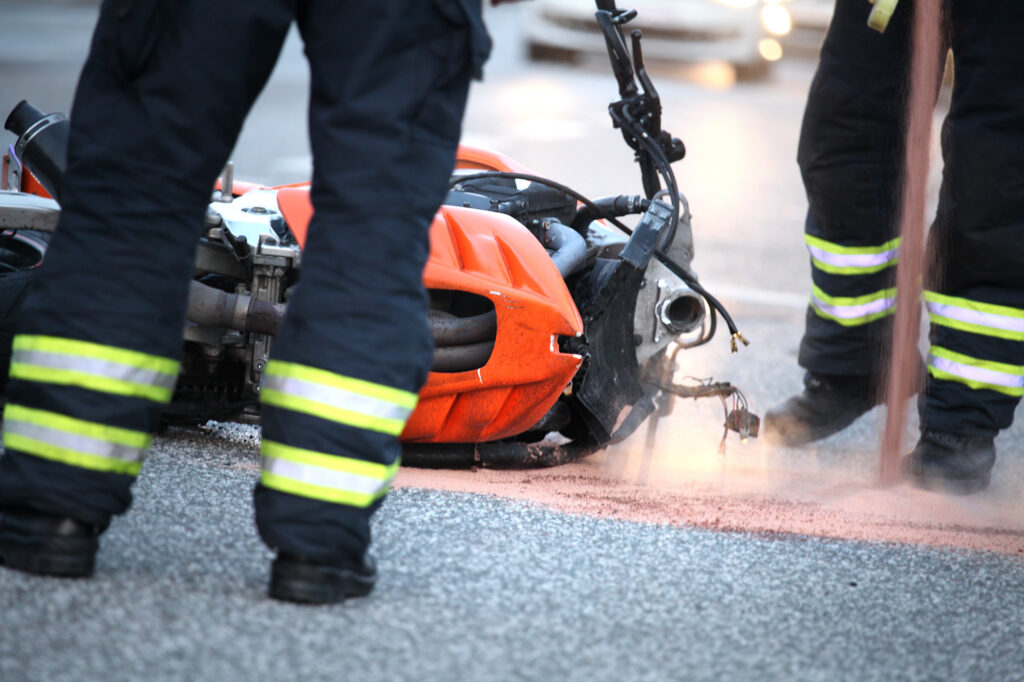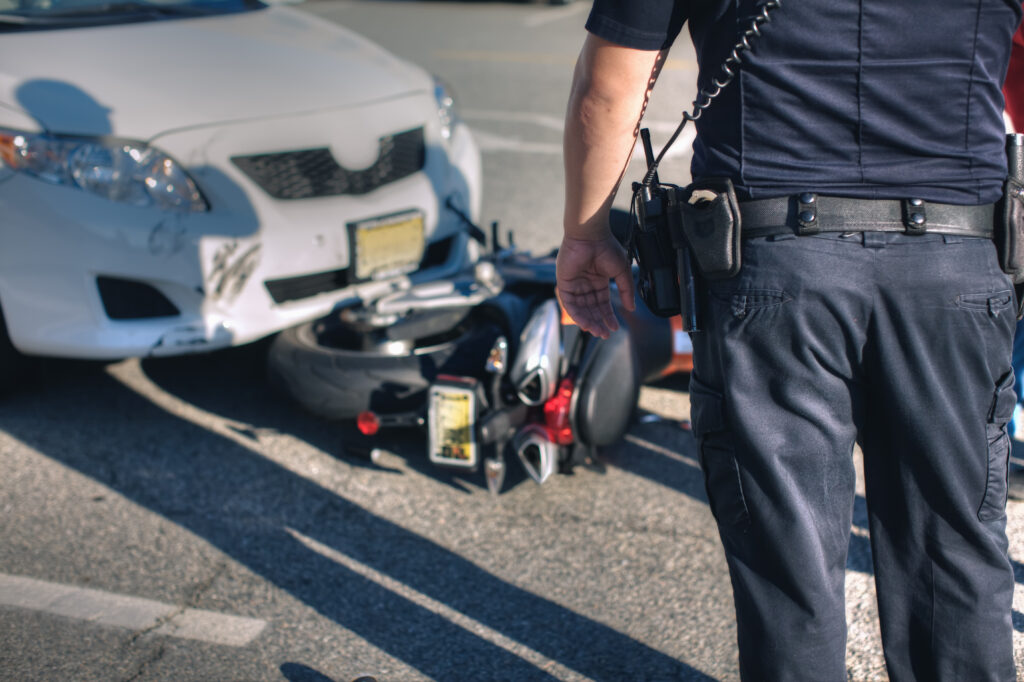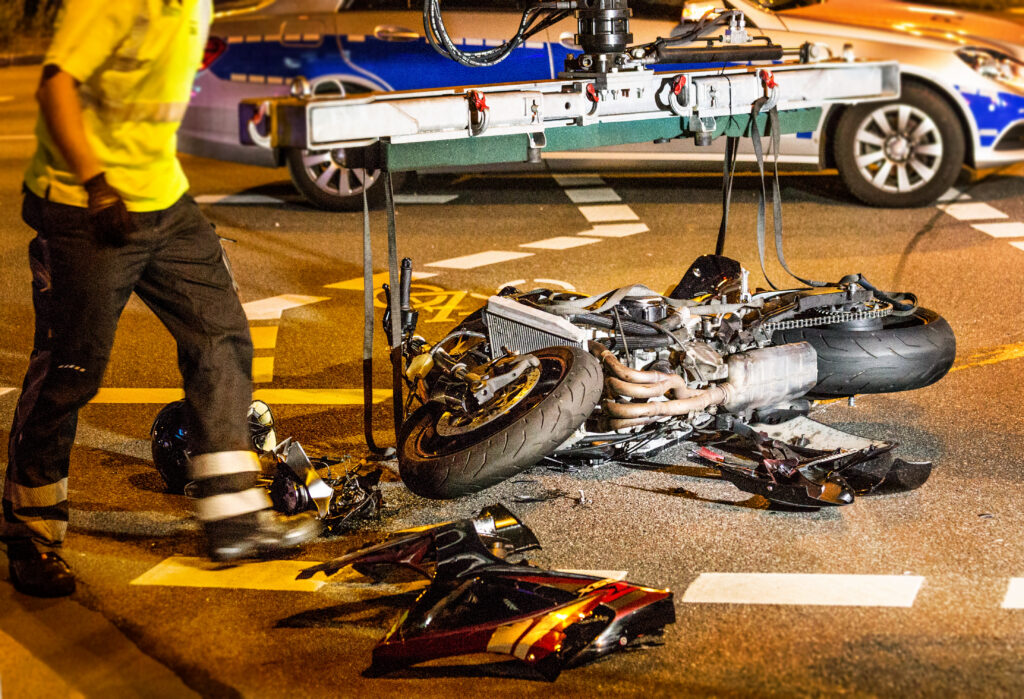Riding a motorcycle is exhilarating for those who love freedom and excitement. It also has its risks. Motorcycle accidents, when they occur, can result in serious injuries or even death. If you have been injured in a motorcycle crash caused by another party’s fault, contact our office asap. We are experienced Yakima motorcycle accident lawyers.

Why You Can Benefit From a Yakima, WA Motorcycle Attorney
As your motorcycle accident attorneys, we protect, and advocate for, you. Benefits of having motorcycle legal representation include:
- Decades of experience in handling motorcycle accident cases. We know the laws and courtrooms. We understand the complex legal issues involved in motorcycle cases. We analyze negligence, insurance, liability, wage loss, disability, and statutory/case law.
- We have attorney(s) on hand who ride and know WA motorcycle laws and regulations.
- Dealing with insurance companies – Insurance carriers may try to deny or minimize your claim. We fight insurance denial or minimization of claims.
- Building a strong case – our lawyers know how to thoroughly investigate accidents, preserve evidence, identify all parties liable, and construct a solid case to prove negligence and damages. This improves your chances of a favorable outcome.
- Connections with experts and professionals – Attorneys have networks of accident investigators, medical experts, actuaries, and other professionals to consult. These contacts help substantiate damages resulting from a motorcycle accident.
- Courtroom experience – If a settlement can’t be reached out of court, our lawyers’ litigation skills and experience are an advantage at trial.
- Managing legal processes – Lawyers handle all aspects of your claim from start to finish. This includes managing paperwork, filings, negotiations, court appearances, and everything in between.
- Relief and focus on recovery – With an attorney on your case, you can devote your energy to healing instead of dealing with legal matters. Our attorneys and staff are a team that fights for you so you can focus on your health.
- Local experience – Our Yakima lawyers are familiar with the local courts, judges, laws, and case history. This provides an advantage over out-of-town attorneys.
What Are Typical Causes For a Motorcycle Accident?
Motorcycle accidents often involve collisions with passenger vehicles or trucks. A common cause is a car driver failing to see a motorcycle on the road. The car driver might, for example, turn in front of the bike. Dangerous road conditions like potholes or debris can cause motorcycle crashes too.
Hazardous driving behaviors factor into many motorcycle wrecks. Speeding, tailgating, improper passing, running red lights, and weaving through traffic put motorcyclists at risk. Impaired drivers under the influence of alcohol or drugs is another major contributor to motorcycle collisions.
Rider inexperience and lack of training can cause motorcycle accidents. Improper braking techniques can lead to loss of control in crashes. Taking curves too fast for riding ability is another common mistake by beginner riders. Mechanical problems like tire blowouts or brake failure can also result in motorcycle accidents.
When Should You Reach Out to a Lawyer?
You should contact our motorcycle accident lawyers as soon as possible after seeking medical treatment for motorcycle collision injuries. The initial consultation is often free. This gets the claims process started right away. We will immediately launch an investigation while the evidence is fresh.
If you are hospitalized due to accident injuries, have a family member reach out to us on your behalf. Severe injuries like fractures, head trauma, spinal cord damage, or amputations require legal help. Our attorneys deal with insurance while you focus on recovery. It is wise and prudent to consult a lawyer before agreeing to any settlement offered from an insurance company. What seems like a decent offer at first may not fully cover all current and future costs.
Seasoned and experienced attorneys know value and will negotiate settlements that cover all the damages and expenses. Beware of the unscrupulous attorneys who guarantee a certain settlement amount. Some use that as bait to lure you in. Our attorneys use a deliberate, methodical and effective approach to leverage the best possible result for you.
What Are The Strongest Pieces of Evidence You Can Use?
Police reports provide official documentation of how the crash occurred and who was at fault. These reports can be in error, and a good attorney will look for errors. Witness statements help prove facts if there is a dispute over liability. Photos and video taken at the accident scene can record evidence of conditions and damage. Medical records thoroughly document the extent of injuries, treatment, and prognosis. Doctors’ diagnoses and expert opinions demonstrate the severity of harm caused by the collision. Itemized bills, receipts, and insurance documentation prove the monetary costs of medical care. Your helmet and gear can show damage and defects indicating the force of impact. Don’t throw this evidence away! Analysis by accident reconstruction experts can scientifically determine speeds, points of impact, and other contributory factors based on evidence. Documentation of lost income resulting from injury validates monetary claims for damages and helps get lost wages and/or future lost earnings awarded.

Typical Injuries from a Motorcycle Accident
Motorcyclists can suffer severe orthopedic injuries in crashes. Broken bones, fractures, and shattered joints occur frequently when riders are thrown from bikes. Spinal cord damage leading to paralysis is another common injury if the spinal column is impacted.
Head and brain trauma such as concussions or traumatic brain injuries result from motorcycle wrecks. Even with a helmet, the brain can still collide with the inside of the skull. Road rash or severe skin abrasions are also common if a motorcyclist slides along the pavement.
Blunt-force trauma to internal organs can happen during motorcycle collisions. This may include lacerations to the liver or spleen, collapsed lungs, or bruised kidneys. Amputation of limbs is possible when motorcyclists are pinned under vehicles. Major blood loss can also occur from deep cuts and severe fractures.
Potential Damages You Can Claim
You can receive monetary compensation for medical expenses, both current and future. This covers hospital bills, surgeries, rehabilitation, physical therapy, and prescription medications for crash injuries. Lost wages can also be reimbursed if you missed work due to recovering from accident trauma.
- Pain and suffering damages account for physical and emotional distress caused by the collision. Compensation can also cover permanent disabilities or disfigurement from sustained injuries.
- Loss of enjoyment of life damages reimburses you for activities you can no longer participate in.
- Punitive damages may be awarded in cases of gross negligence or in civil rights contexts.
- Property damage covers repair or replacement costs for your motorcycle, clothing, and any personal items damaged.
- Wrongful death damages apply if a fatality occurred, providing for funeral costs and loss of companionship.
Making a Claim on Someone Else’s Behalf
If the motorcyclist suffered serious injuries that prevent them from acting on their own behalf, a family member can be appointed to make a claim as their representative. This person must have the legal authority to make decisions for the injured party, either through power of attorney, guardianship, or appointment by a court. Consult a lawyer to determine the best approach based on the circumstances.
Representatives should gather as much evidence and documentation about the accident as they can, such as medical records, crash reports, and eyewitness accounts. Keep detailed records of all expenses related to medical treatment, property damage, lost income, and other monetary losses from the injuries. Have doctors and experts evaluate the motorcyclist’s condition.
With our lawyers’ guidance, the authorized representative submits a demand letter and authorizes negotiations with insurance companies. The settlement proceeds are designed to cover the motorcyclist’s damages, future medical costs, pain and suffering. If the claim is denied or inadequate, filing a personal injury lawsuit may be the next step.

What Happens if There is Little Evidence?
If there is little evidence available from the motorcycle accident scene, it may be somewhat challenging to prove fault and damages. Police may not be able to determine the liable party, for example, without eyewitness accounts or skid marks. Lack of documentation also means fewer records to support injury claims and expenses.
Our attorneys will thoroughly interview you to build a strong case. Identifying potential witnesses is crucial even if their recollection is hazy. Circumstantial evidence and inferences may help reconstruct the accident. Vivid details from the injured rider can supplement limited physical evidence.
Despite sparse evidence, an experienced lawyer can still work to establish negligence and damages. They may hire accident reconstruction experts to analyze debris and vehicle damage. An experienced lawyer emphasizes strengths in a case, such as the rider’s injuries and healthcare costs. Though difficult, skilled litigators can still achieve reasonable settlements or trial results through persistence and creativity. However, it may require taking the case to trial.
How Does Fault Work in Washington?
Washington incorporates concepts of “comparative negligence” when determining fault and liability in motorcycle crashes. This means that fault can be apportioned to more than one party or actor. Even a person deemed to be partially at fault can recover damages proportional, for example, to the other driver’s negligence. For example, if you were deemed 30% at fault, you could still potentially recover 70% of your damages.
Even if you were over 50% at fault for the accident, you may be able to recover damages under certain circumstances. Insurance companies will often make their own assessment of who’s at fault. They could be correct, or wrong. Don’t assume they know. Often they don’t know and are guessing.
Our experienced attorneys can make a variety of legal arguments, such as the doctrine of “last clear chance”, claiming the other driver had an opportunity to avoid the collision but negligently failed to do so.
Who May Be Liable For the Injury?
Negligent driver’s are to be held accountable and bear the brunt of liability. Common negligent behaviors include distracted or impaired driving, speeding, illegal turning, and violating traffic signals. Even if you were partially at fault, the driver may still have liability.
If there was a defect with the motorcycle or other vehicle that caused or contributed to the crash, the manufacturer could share liability. Examples include brake failure, tire blowout, faulty vehicle parts, or design flaws. The maker may be liable if they were negligent or did not meet safety standards. Product liability claims are very complex.
In some cases, a government entity could potentially bear responsibility for motorcycle accidents. This includes improper road design, lack of signage, objects obstructing roadways, poor maintenance, and other hazardous conditions. A claim against the government involves special processes and must typically be filed sooner than a standard injury lawsuit.
Statute of Limitations – Beware!
In Washington, you generally have three years from the date of a motorcycle accident to file a personal injury lawsuit. This is known as the statute of limitations for filing a claim. If you wait longer than three years, you may end up losing your right to recover compensation.
If a motorcyclist dies due to accident injuries, family members generally have the same time period of three years from the date of death to file a wrongful death lawsuit, but there are circumstances that catch the unwary with shorter periods or certain filing peculiarities. Meet with our attorneys promptly to avoid missing this deadline.
Claim against a potentially at-fault government entity involves an administrative claim form and process that must be properly filed with the government entity involved. The government entity generally has 60 days to review the matter generally before you can file suit. Know your rights. It can get complex.
If an accident happens within a tribal nation’s jurisdiction, the time limits are different and require specialized knowledge of that particular tribal nation’s laws. Contact our attorneys if you have any questions.
You Deserve to Seek Justice For Your Motorcycle Accident
Dealing with the effects of a motorcycle crash can feel overwhelming. You likely have injuries, growing medical bills, disrupted income, and uncertainty about the future. With compassion and expertise, our team will take the burden of the legal process off your shoulders while you focus on healing.
Do not go through the process alone when you don’t have to. We will protect your rights every step of the way.
Contact us for a free consultation so we can review the details, answer all your questions, and start mapping out a legal strategy. While we cannot undo a tragic crash, together we can move forward to obtain potential financial recovery and closure you need to get your life back.
